-
 Bitcoin
Bitcoin $82,683.4967
0.78% -
 Ethereum
Ethereum $1,829.2967
1.42% -
 Tether USDt
Tether USDt $0.9999
-0.02% -
 XRP
XRP $2.0967
-0.75% -
 BNB
BNB $606.5472
1.02% -
 Solana
Solana $125.0276
0.61% -
 USDC
USDC $1.0000
-0.01% -
 Dogecoin
Dogecoin $0.1676
0.95% -
 Cardano
Cardano $0.6650
1.26% -
 TRON
TRON $0.2382
2.59% -
 Toncoin
Toncoin $4.1025
5.56% -
 Chainlink
Chainlink $13.5754
1.83% -
 UNUS SED LEO
UNUS SED LEO $9.1395
0.29% -
 Stellar
Stellar $0.2651
-0.15% -
 Avalanche
Avalanche $18.8485
0.75% -
 Shiba Inu
Shiba Inu $0.0...01250
0.76% -
 Sui
Sui $2.2808
-1.77% -
 Hedera
Hedera $0.1640
-1.56% -
 Polkadot
Polkadot $4.0427
0.61% -
 Litecoin
Litecoin $83.3594
-2.70% -
 MANTRA
MANTRA $6.2703
0.56% -
 Bitcoin Cash
Bitcoin Cash $304.1339
1.64% -
 Bitget Token
Bitget Token $4.5229
-1.25% -
 Dai
Dai $0.9999
-0.02% -
 Ethena USDe
Ethena USDe $0.9998
-0.03% -
 Pi
Pi $0.7229
-6.19% -
 Hyperliquid
Hyperliquid $13.0555
5.79% -
 Monero
Monero $215.2463
-1.28% -
 Uniswap
Uniswap $6.0107
2.74% -
 Aptos
Aptos $5.2988
0.53%
How do cold and hot storage affect the security of Bitcoin wallets?
Bitcoin wallet security depends heavily on storage: hot wallets (web, mobile, desktop) offer convenience but are vulnerable to online threats, while cold wallets (hardware, paper, offline software) provide superior offline protection, ideal for significant holdings.
Mar 25, 2025 at 05:50 am
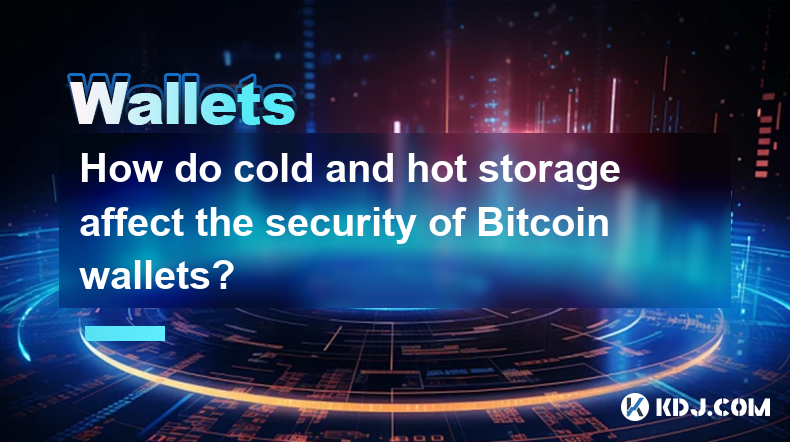
How do Cold and Hot Storage Affect the Security of Bitcoin Wallets?
Bitcoin security hinges significantly on the storage method employed. The primary dichotomy lies between "hot" and "cold" wallets, each offering varying degrees of security and accessibility. Understanding their differences is crucial for safeguarding your Bitcoin holdings.
Hot wallets, connected to the internet, offer immediate accessibility. Think of them as your everyday checking account. This convenience, however, comes at a cost. The constant online connection makes them vulnerable to hacking, malware, and phishing attacks. Examples include web wallets, mobile wallets, and desktop wallets. The ease of use often outweighs the security concerns for smaller amounts or frequent transactions.
Cold wallets, conversely, are not connected to the internet. They are akin to a safe deposit box at a bank. This offline nature significantly reduces the risk of cyberattacks. Hardware wallets, paper wallets, and even offline software wallets fall under this category. While offering superior security, they necessitate a more deliberate approach to transactions. The added security layer makes them ideal for long-term storage of significant Bitcoin holdings.
Let's delve deeper into the security implications of each:
Hot Wallet Security Concerns:
- Hacking: Online wallets are susceptible to hacking attempts targeting vulnerabilities in their software or servers.
- Malware: Malicious software can steal your private keys if your device is infected.
- Phishing: Deceptive emails or websites can trick users into revealing their login credentials or private keys.
- Exchange Hacks: If you store Bitcoin on an exchange, you're relying on their security measures, which can be compromised.
Cold Wallet Security Advantages:
- Offline Protection: The primary advantage is the lack of internet connection, making them largely immune to online threats.
- Private Key Control: You maintain complete control of your private keys, reducing reliance on third-party services.
- Enhanced Security: Cold storage significantly reduces the risk of theft through hacking or malware.
- Reduced Vulnerability: The offline nature protects against phishing scams and other social engineering attacks.
Hardware Wallets:
These physical devices offer a robust solution. They are essentially USB drives designed to store your private keys securely. They typically have a screen for verifying transactions, adding an extra layer of security. Reputable brands offer a high degree of protection. However, physical loss or damage remains a risk.
Paper Wallets:
These involve printing your public and private keys on paper. While extremely secure if stored safely and correctly, they're susceptible to physical damage, loss, or theft. Careful handling and storage are paramount. They also require a significant understanding of cryptography to use effectively.
Software Wallets (Offline):
Software wallets can be used offline, providing a decent level of security. This method requires a meticulous approach to ensuring the software remains untouched by internet-connected devices. Any interaction with an infected device could compromise the security.
Choosing the Right Storage Method:
The ideal storage method depends on your needs and risk tolerance. For small amounts and frequent transactions, a reputable hot wallet might suffice. However, for significant holdings or long-term storage, cold storage is strongly recommended. A multi-sig setup across different cold and hot wallets could be a more secure strategy.
Security Best Practices Regardless of Storage:
- Strong Passwords: Use strong, unique passwords for all your wallets and accounts.
- Two-Factor Authentication (2FA): Enable 2FA whenever possible to add an extra layer of security.
- Regular Software Updates: Keep your software updated to patch security vulnerabilities.
- Antivirus Software: Use reputable antivirus software to protect your devices.
- Beware of Phishing Scams: Be cautious of suspicious emails, websites, and messages.
Frequently Asked Questions:
Q: What is the safest way to store Bitcoin?
A: The safest method is typically considered cold storage, specifically using a reputable hardware wallet. However, even with cold storage, physical security measures like safekeeping and backups are crucial.
Q: Are hot wallets completely insecure?
A: No, hot wallets aren't inherently insecure, but they are significantly more vulnerable to online attacks compared to cold storage. The risk level increases with the amount of Bitcoin stored.
Q: Can I recover my Bitcoin if I lose my cold wallet?
A: The recovery process depends on the type of cold wallet. With a hardware wallet, recovery procedures vary by manufacturer, often involving a recovery seed phrase. Losing a paper wallet generally results in irreversible loss of funds.
Q: What are the risks associated with using a paper wallet?
A: Paper wallets are vulnerable to physical damage, loss, theft, and fire. They also require a high level of user responsibility and understanding to use safely.
Q: How do I choose a reputable hardware wallet?
A: Research well-established brands with a strong reputation for security and positive user reviews. Look for features like a secure element chip and a clear recovery seed process.
Q: Are exchanges a safe place to store Bitcoin long-term?
A: Exchanges are generally not recommended for long-term storage due to the inherent risks of hacking and exchange failures. They should be used primarily for trading and short-term holding.
Disclaimer:info@kdj.com
The information provided is not trading advice. kdj.com does not assume any responsibility for any investments made based on the information provided in this article. Cryptocurrencies are highly volatile and it is highly recommended that you invest with caution after thorough research!
If you believe that the content used on this website infringes your copyright, please contact us immediately (info@kdj.com) and we will delete it promptly.
- Bitcoin (BTC) price dips below ascending channel pattern as whales mirror a 2020 bull run signal
- 2025-04-01 07:50:12
- Mutuum Finance (MUTM) Has Been Relatively Quiet, But It's Building Fast
- 2025-04-01 07:50:12
- Cardano (ADA) Gains 4% This Week, Trading at $0.74 as Bullish Pressure Builds
- 2025-04-01 07:45:12
- Elon Musk Quashes Rumors of U.S. Government Using Dogecoin (DOGE) in Any Kind of Operations
- 2025-04-01 07:45:12
- Ethereum (ETH) and Solana (SOL) Prices Could Plunge as FTX Begins Creditor Repayments on May 30
- 2025-04-01 07:40:12
- Acting SEC Chair Rejects Enforcement, First US Bank-Issued Stablecoin, Bitcoin's Four-Year Cycle at Crossroads
- 2025-04-01 07:40:12
Related knowledge
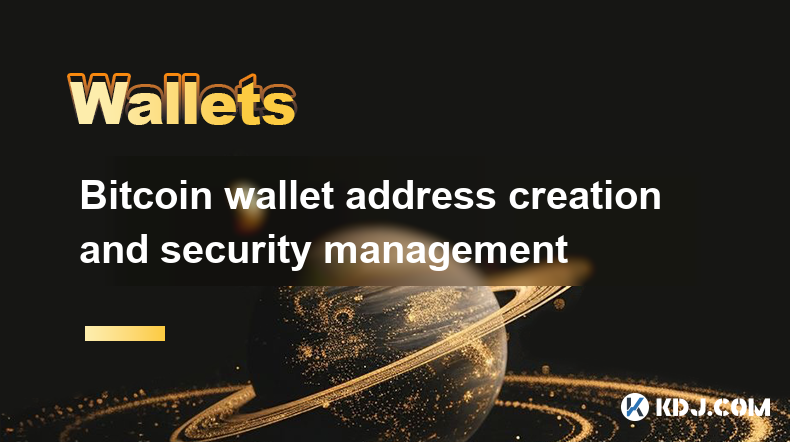
Bitcoin wallet address creation and security management
Mar 31,2025 at 10:56pm
Understanding Bitcoin Wallet AddressesA Bitcoin wallet doesn't store Bitcoin directly. Instead, it stores private keys which are long strings of characters. These keys grant access to your Bitcoin. Your public key, derived from the private key, is used to generate your Bitcoin wallet address, a unique identifier similar to a bank account number. This a...

How to easily generate a Bitcoin payment address
Mar 29,2025 at 10:49am
Generating a Bitcoin payment address might seem daunting, but it's actually quite straightforward. This process is crucial for receiving Bitcoin, as each transaction requires a unique address. Understanding how this works is fundamental to using Bitcoin effectively. This guide will walk you through the simple steps, regardless of your technical experti...
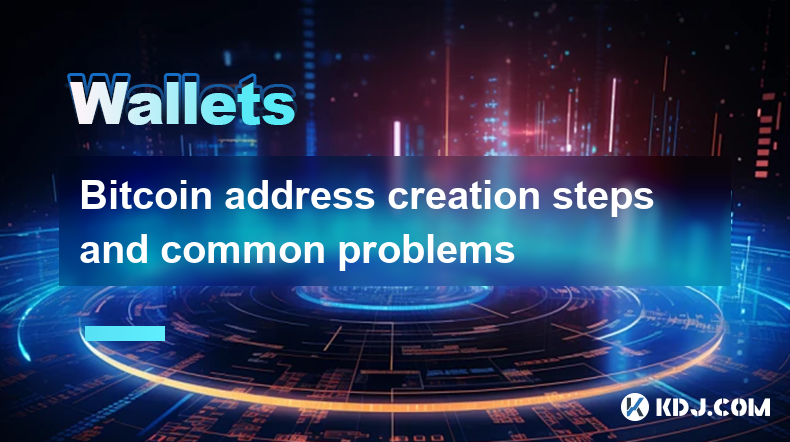
Bitcoin address creation steps and common problems
Mar 30,2025 at 06:07am
Understanding Bitcoin AddressesA Bitcoin address is a unique identifier, similar to a bank account number, used to receive Bitcoin. It's a string of alphanumeric characters generated from a public key, derived from your private key. Understanding the distinction between public and private keys is crucial for Bitcoin security. Your private key should be...
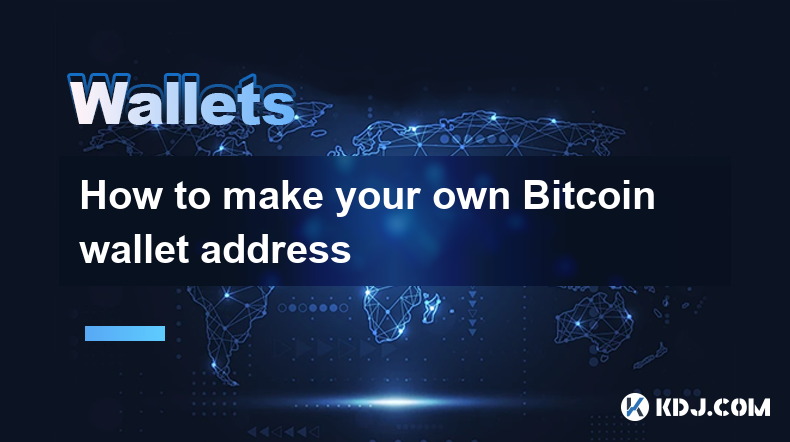
How to make your own Bitcoin wallet address
Mar 29,2025 at 08:42pm
Creating your own Bitcoin wallet address is crucial for securing and managing your Bitcoin holdings. It allows you to independently receive and send Bitcoin without relying on third-party services. This process involves understanding the different types of wallets and choosing the one that best suits your needs and technical expertise. Incorrectly gene...
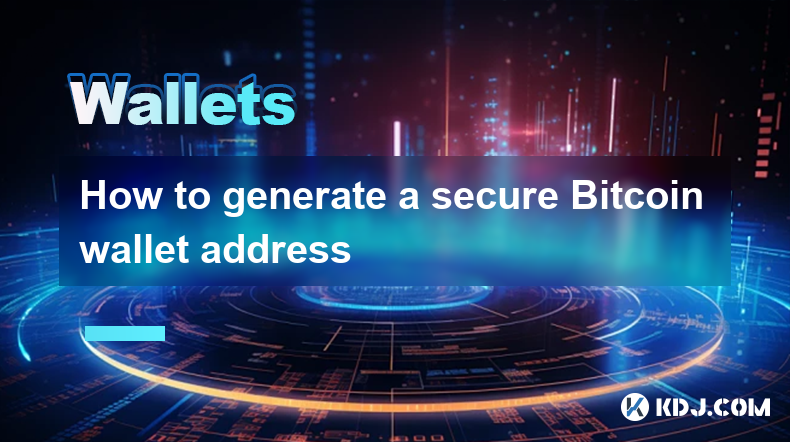
How to generate a secure Bitcoin wallet address
Apr 01,2025 at 03:14am
Understanding Bitcoin Wallet AddressesA Bitcoin wallet doesn't actually store your Bitcoin. Instead, it stores your private keys, which are long strings of characters that grant you access to your Bitcoin. Your public key, derived from your private key, is used to generate your Bitcoin address, a unique identifier similar to a bank account number. This...
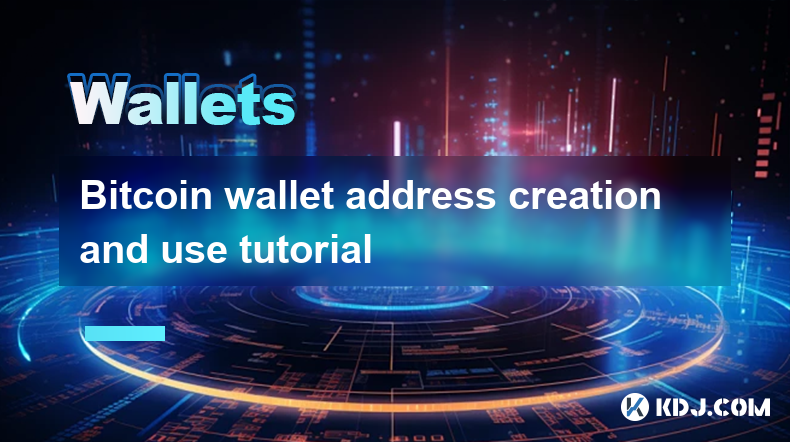
Bitcoin wallet address creation and use tutorial
Mar 29,2025 at 10:14pm
Understanding Bitcoin Wallet AddressesA Bitcoin wallet doesn't store Bitcoin in the way a traditional bank account does. Instead, it stores private keys, which are cryptographic secrets allowing you to access and spend your Bitcoin. Your Bitcoin address, on the other hand, is a public identifier, like an email address, that others can use to send you B...

Bitcoin wallet address creation and security management
Mar 31,2025 at 10:56pm
Understanding Bitcoin Wallet AddressesA Bitcoin wallet doesn't store Bitcoin directly. Instead, it stores private keys which are long strings of characters. These keys grant access to your Bitcoin. Your public key, derived from the private key, is used to generate your Bitcoin wallet address, a unique identifier similar to a bank account number. This a...

How to easily generate a Bitcoin payment address
Mar 29,2025 at 10:49am
Generating a Bitcoin payment address might seem daunting, but it's actually quite straightforward. This process is crucial for receiving Bitcoin, as each transaction requires a unique address. Understanding how this works is fundamental to using Bitcoin effectively. This guide will walk you through the simple steps, regardless of your technical experti...

Bitcoin address creation steps and common problems
Mar 30,2025 at 06:07am
Understanding Bitcoin AddressesA Bitcoin address is a unique identifier, similar to a bank account number, used to receive Bitcoin. It's a string of alphanumeric characters generated from a public key, derived from your private key. Understanding the distinction between public and private keys is crucial for Bitcoin security. Your private key should be...

How to make your own Bitcoin wallet address
Mar 29,2025 at 08:42pm
Creating your own Bitcoin wallet address is crucial for securing and managing your Bitcoin holdings. It allows you to independently receive and send Bitcoin without relying on third-party services. This process involves understanding the different types of wallets and choosing the one that best suits your needs and technical expertise. Incorrectly gene...

How to generate a secure Bitcoin wallet address
Apr 01,2025 at 03:14am
Understanding Bitcoin Wallet AddressesA Bitcoin wallet doesn't actually store your Bitcoin. Instead, it stores your private keys, which are long strings of characters that grant you access to your Bitcoin. Your public key, derived from your private key, is used to generate your Bitcoin address, a unique identifier similar to a bank account number. This...

Bitcoin wallet address creation and use tutorial
Mar 29,2025 at 10:14pm
Understanding Bitcoin Wallet AddressesA Bitcoin wallet doesn't store Bitcoin in the way a traditional bank account does. Instead, it stores private keys, which are cryptographic secrets allowing you to access and spend your Bitcoin. Your Bitcoin address, on the other hand, is a public identifier, like an email address, that others can use to send you B...
See all articles























































































